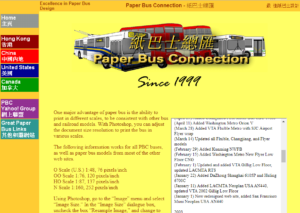The birth of PBC
My paper bus hobby started in 1998. Before that time, there were a few creators of online paper bus models. Stephen Mak, with his boxy style paper bus models, initiated the hobby of online paper buses. Mak’s models, because they were more or less confined in a box, lacked details and looked simplistic.
Tom Chen, another creator, created the most popular bus model style in use to date. The reason that myself, along with many others, create models based on his style, is because his style were not confine in a box. His early models of Hong Kong buses captured the slopes, curvatures, and other essential details of the real buses, and were scaled properly to look good both on the screen and on the paper. His model of the CMB Guy Arab in Alexander Body was eye opening.
In 1998, I mostly repainted buses for imaginary operators and did not put them online. Then I became interested in historic Hong Kong buses as KY Chung, another early paper bus creator, was designing quite a few Hong Kong historic models based on Tom Chen’s style. I started my online presence by creating a few historic models for KY’s web site (including Citybus Volvo V1) and assisting him on his design (single deck CMB Guy Arab).
In May 1999, I started PBC at Xoom.com (later became NBCi). I started out with mostly a few historic Hong Kong buses. At that time, paper buses gained popularity in Hong Kong with many fans opened their own web site. But instead of following the crowd that primarily focused on new buses in Hong Kong, and subsequently copy each other’s models, I chose to pursue originality.
The growth of PBC and introduction of North American models
On Christmas Day in 1999, PBC made a significant contribution to the paper bus community with the release of KMB Daimler CVG5 and CVG6 half-cab buses, both famous historic bus models in Hong Kong. Days earlier, PBC released its first North American model, VTA Gillig Phantom.
The production of Gillig Phantom presented a unique challenge that I literally had to make the bus from scratch, with the exception of the wheels. For the Hong Kong models, I was able to base my work on the earlier design by KY Chung or Tom Chen. However for the North American model I had to draw elements such as turning lights since there was nothing similar in Tom Chen’s style to borrow from.
In 2000 and 2001, PBC released popular North American models like Flxible, RTS, and New Flyer. PBC also offered the most-complete line up of single deck and double deck KMB historic buses. As paper buses were gaining popularity in the Britain, PBC released the model of the famous AEC Routemaster for the British community.
In mid 2001, NBCi shutdown its free web services and the site eventually moved to Homestead.
Introduction of Mainland Chinese models and creation of PBC Yahoo Group
By 2002, there were few paper models of buses in Mainland China on the Internet; most of them were second hand double deck buses from Hong Kong, which were not representative of the buses operating in most Chinese cities. Creating paper models of Chinese buses was not easy. There were many bus manufacturers in China and many of them carry a wide range of models. It took months for me to research the differences between the manufacturers and models by visiting Chinese bus web site and bulletin boards.
However a Chinese manufacturer, Changjiang, manufactured models based on Flxible in the US. I subsequently created a Chinese Flxible based on the American design that I created two years ago. The first PBC Chinese model, the Beijing Citybus was released in November 2002.
In 2003, popular Chinese bus models such as Sunwin/Volvo and King Kong were offered. Cities represented include Beijing, Shenzhen, Shanghai and Tianjin.
As bus fans in China were being exposed to the hobby of paper bus, the paper bus fan base in North America was growing and new paper bus site were opened focusing exclusively on North American buses. To better communicate with the fan base, PBC opened its Yahoo Group in Oct 2003.
Paperbuses.com
The move to paperbuses.com in late 2008 represents a new era for Paper Bus Connection. This new web site will be much more accessible to every paper bus fans around the world.




